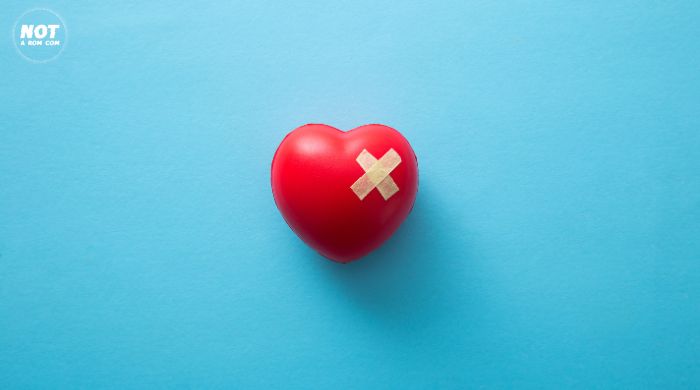Breakups can be challenging, leaving many wondering, “How long does it take to get over a breakup?” The answer varies due to factors like the intensity of the relationship, individual resilience, and self-care strategies. While the timeline may differ, most people experience emotional and physical pain in the aftermath.
This article explores the journey from heartbreak to healing, providing coping strategies and insights into the factors that influence recovery.
Table of Contents
Why Breakups Hurt So Much: The Psychology of Heartbreak

Breakups often trigger emotional and physical pain because the brain perceives separation as a form of loss, much like physical trauma. For the vast majority, the breakup recovery process mirrors grief stages, including denial, anger, and acceptance, which help individuals process emotional pain.
In romantic relationships, bonding chemicals like oxytocin and dopamine create strong connections; when a breakup happens, these “feel-good” chemicals decrease sharply, leading to emotional withdrawal symptoms.
Understanding the science behind heartbreak equips people to manage these strong emotions more effectively, allowing for healthier self-discovery and resilience in moving forward.
Check our guide on: My Ex Moved On Like I Was Nothing
How Long Does It Take to Heal?

There’s no definitive answer to how long it takes to heal after a breakup, as each journey is unique. Studies suggest that recovery can take from a few weeks to several months post-breakup, with most people beginning to feel significantly better around the three-month mark. However, everyone heals at their own pace, impacted by self-care, coping strategies, and support systems.
While some may take just a few weeks to feel better, others, especially if the breakup happened after a long relationship, may need more time to process negative emotions, feel sad, and find closure. Embracing the healing journey rather than focusing on a timeline promotes genuine emotional recovery.
Common Factors Influencing Breakup Recovery Time
1. Length and Depth of the Relationship
The longer and deeper the connection, the more challenging it can be to recover from a breakup. People often experience a broken heart based on the relationship’s impact, not merely its duration. A meaningful connection, even if brief, can leave an emotional mark, whereas moving on from a low-quality relationship may feel easier.
An important factor is how central the relationship was to one’s identity; the end of one relationship can create a void, making it harder to move forward. This is why shorter, intense relationships may still take time to heal, as emotional pain is often tied to the depth of connection.
2. Living Arrangements and Shared Responsibilities (Kids, Pets, Property)
Living arrangements and shared responsibilities, like co-parenting children or caring for pets, can make recovery more complex. Even after the breakup happens, regular interactions with an ex-partner due to shared obligations can prolong the healing process.
These responsibilities require setting boundaries and managing strong emotions effectively, as frequent encounters often bring back feelings from the past relationship.
In such cases, establishing emotional distance can support a healthier breakup recovery process.
3. Attachment Styles and Emotional Resilience
Attachment styles significantly impact how people handle breakups. Individuals with secure attachment tend to heal more smoothly, while those with anxious or avoidant attachment styles may experience more prolonged pain.
Emotional resilience is an essential factor, as it determines how well someone can cope with the loss of a romantic relationship. A secure attachment style, combined with positive coping mechanisms, encourages a more balanced grieving process and an easier time letting go.
4. Social Media’s Impact on Healing After a Breakup
Constant exposure to an ex-partner’s updates can impede recovery. Research shows that seeing an ex on social media can stir feelings of longing and inhibit personal growth. Blocking or muting an ex-partner on platforms like Instagram and Facebook can prevent the resurgence of painful emotions, allowing individuals to heal without constant reminders.
Maintaining distance online is as important as physical separation, especially in the first few weeks, to focus on self-care and moving forward.
Checkout our amazing guide on How to Reconnect After a Relationship Break
Practical Tips to Move On and Heal from a Breakup
1. Following the “No Contact” Rule for Emotional Distance
The “No Contact” rule is a powerful tool in healing. Avoiding all contact with an ex helps individuals create emotional distance, allowing time to process the breakup without relapsing into past emotions. By enforcing boundaries, people can focus on self-discovery and avoid negative emotions often triggered by re-engagement.
This coping mechanism is particularly effective for those dealing with intense pain from a recent breakup, providing space for healing and a clearer perspective on moving forward.
2. Coping Strategies: Journaling, Meditation, and Exercise
Practicing coping strategies like journaling, meditation, and exercise fosters emotional well-being post-breakup. Journaling allows individuals to process strong emotions by putting them into words. Meditation, on the other hand, helps calm the mind and reduce stress, while physical exercise boosts endorphins, lifting one’s mood.
These activities promote positive psychology, encourage self-confidence, and are valuable tools in overcoming emotional pain and finding inner peace.
3. Self-Care Practices to Boost Mental Health
Self-care is important during breakup recovery, as it promotes overall well-being and positive mental health. Engaging in activities that boost happiness, like taking up new hobbies, spending time in nature, or pampering oneself, makes a big difference. Such practices empower individuals to move on, restore self-confidence, and foster resilience.
The healing process becomes smoother when people prioritize self-care, allowing them to gradually reconnect with their best selves.
4. Leaning on Friends and Family for Support
You can seek support from loved ones provides comfort and perspective during a painful breakup. Friends and family members offer a sense of belonging, helping to counter feelings of isolation. Whether through shared activities or open conversations, connecting with others is an effective coping strategy.
Emotional support strengthens mental health, reminding people that they’re not alone and allowing them to heal in a nurturing environment.
Must read guide on How to Leave a Toxic Relationship When You Live Together
Emotional Challenges You Might Face During Recovery
1. Overcoming Self-Blame and Negative Thought Patterns
Breakups often lead to self-blame, with people questioning if they were at fault when a relationship ends. Dwelling on these negative emotions can slow the breakup recovery process, prolonging emotional pain. Practicing self-compassion becomes essential to help shift away from self-blame.
Using positive self-talk and focusing on self-discovery can encourage healthier thought patterns. Viewing the breakup as a learning experience rather than a failure allows individuals to better navigate the journey toward self-acceptance and emotional resilience. This mindset helps make moving forward more achievable and productive.
2. Avoiding Rebound Relationships
Jumping into a new relationship soon after a breakup can delay emotional recovery, as unresolved feelings often resurface. Rebound relationships tend to be temporary solutions to emotional pain rather than long-term connections.
Instead, focusing on self-growth allows individuals to heal properly, making it easier to form healthier relationships in the future. Building emotional stability before pursuing another relationship prevents carrying past relationship baggage forward.
3. Dealing with Loneliness and Isolation
Loneliness is a common feeling post-breakup, especially if the relationship lasted a long time, but prolonged isolation can worsen emotional pain. Staying connected with friends or engaging in social activities helps prevent excessive isolation, which can otherwise hinder healing.
Reaching out and building new connections can alleviate loneliness, making the breakup recovery process smoother and more manageable.
Filling one’s time with meaningful interactions and new hobbies offers positive distraction, helping to foster a brighter future outlook. These connections provide essential support, promoting emotional resilience and well-being.
4. Managing Overthinking and Finding Closure
Overthinking past relationships can lead to a cycle of regret and grief. Seeking closure by accepting the breakup’s reality is important to moving forward. Individuals can establish closure by reflecting on the relationship’s impact and lessons learned.
This perspective shift provides a sense of peace and helps avoid dwelling on the past. Ultimately, letting go of the need for answers facilitates healing and opens the door to new possibilities.
How to Know When You’re Truly Over Your Ex
Knowing you’re truly over your ex is marked by emotional freedom and a sense of closure. When memories of the past relationship no longer bring intense emotions, and you feel ready to embrace new relationships without lingering pain, you’re likely moving forward. Self-confidence returns, and you begin focusing on personal growth and new hobbies.
Positive thoughts about the future replace any longing for the past. This phase brings inner peace, allowing you to view the breakup as a learning experience, ultimately paving the way for healthier connections.
Final Words
Breakups are undoubtedly painful, as many people feel pain both emotionally and physically. However, they also offer valuable opportunities for personal growth. Embracing self-care, leaning on support systems, and learning to manage strong emotions are important steps in this healing journey. Remember, the healing process is unique to each person and cannot be rushed.
By practicing self-compassion, focusing on personal development, talking to right therapist, and envisioning a better future, individuals can eventually find peace. In time, they may look back on the relationship with understanding and positivity, appreciating the growth that emerged from it.
FAQs – Getting Over a Breakup
How Long On Average Does It Take To Get Over A Breakup?
On average, it takes around three to six months to recover from a breakup. However, this varies greatly, as factors like relationship length, emotional resilience, and self-care practices impact healing time. Many feel better after focusing on self-discovery and mental health.
What Are The 5 Stages of Break-Up?
The five stages of breakup mirror grief: denial, anger, bargaining, depression, and acceptance. Progressing through these stages helps individuals process strong emotions, release negative feelings, and ultimately accept the breakup to enable genuine healing and personal growth.
Can Staying Friends With An Ex Slow Down Healing?
Staying friends with an ex can slow down healing, as it keeps emotional ties active. To truly get over a breakup, experts recommend emotional distance and focusing on self-care, allowing space to process feelings and move forward healthily.
How Long Does It Take To Get Over An Ex You Still Love?
Getting over an ex you still love may take six months or longer, depending on emotional resilience and coping strategies. Prioritizing self-care and engaging in new hobbies can gradually replace lingering feelings with a positive outlook on the future.
How Long Does It Take To Get Over Someone You Truly Loved?
Getting over from someone you truly loved often takes several months to a year. The deeper the connection, the longer the healing process, but focusing on personal growth and self-compassion helps ease the emotional pain and fosters new, healthy relationships.
When Should You Consider Moving On To A New Relationship?
Consider moving on to a new relationship once past emotional pain has subsided and self-confidence is restored. When you’re ready to embrace a fresh connection without past relationship baggage, it indicates you’re prepared to start anew healthily.
Here is what our audience is reading the most:
How to Glow Up After a Breakup
How to Deal with Jealousy in a Relationship
How to Rebuild Trust in a Relationship
Natalie Gomez, the insightful creator and author behind NotARomCom, is a passionate relationship enthusiast, fervent writer, and ardent advocate for love in all its forms. With a heart full of compassion and a mind brimming with curiosity, Natalie embarked on a journey to explore the intricate dynamics of relationships, love, and personal growth.

